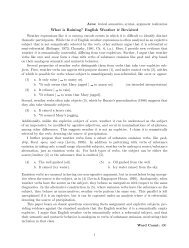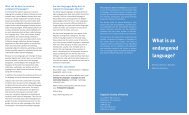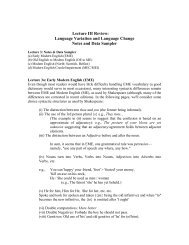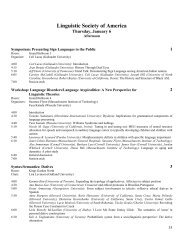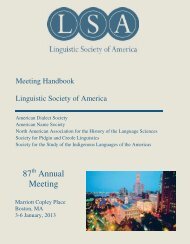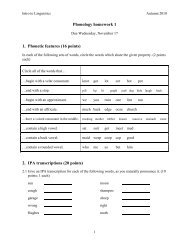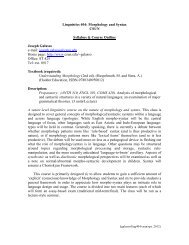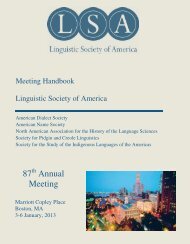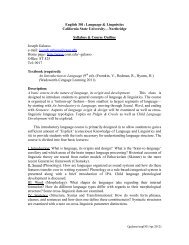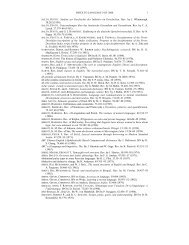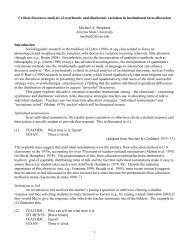side effect <strong>of</strong> a significant independent configurational difference between clauses in Russian involving <strong>the</strong> presence <strong>of</strong> a matrix leftperiphery functional category TopicP that is absent in embedded contexts. We provide an account <strong>of</strong> Russian multiple sluicing,showing it is syntactically parallel to multiple wh-movement. We end with a discussion <strong>of</strong> a striking (and previously unnoticed)adjunct/argument asymmetry lending support to <strong>the</strong> purely syntactic account.Nikki Seifert (University <strong>of</strong> Texas, Austin) Session 59An OT account <strong>of</strong> stress patterns in African <strong>America</strong>n English: BIN, been, D n, & DOI present an optimality <strong>the</strong>oretic (OT) analysis <strong>of</strong> word- and sentence-level stress patterns in African <strong>America</strong>n English (AAE). Ifocus on emphatic DO; stressed BIN, nonstressed been, and unstressed d n; and <strong>the</strong> interaction <strong>of</strong> <strong>the</strong> stresses on <strong>the</strong>se words and beatpatterns <strong>of</strong> phrasal constituents (following, e.g., Selkirk 1984, 1995). The data show that lexically stressed BIN affects <strong>the</strong> beatpatterns <strong>of</strong> a sentence differently than does <strong>the</strong> pragmatically stressed DO, illustrating <strong>the</strong> ways in which <strong>the</strong> AAE lexicon, semantics,and pragmatics interface with phonology.Angelina Serratos (University <strong>of</strong> Arizona) WITHDRAWN Session 16Chemehuevi causatives: Lexical or syntactic?Angelina Serratos (University <strong>of</strong> Arizona) Session 95Predication in ChemehueviI discuss predicational properties <strong>of</strong> nouns, adjectives, and verbs in Chemehuevi, an endangered Sou<strong>the</strong>rn Numic language <strong>of</strong> <strong>the</strong> Uto-Aztecan family. The <strong>the</strong>oretical framework <strong>of</strong> this work is Baker's (2003) <strong>the</strong>ory <strong>of</strong> predication, in which nouns and adjectives requirea functional projection Pred to form a predicate, but verbs can form predicates independently. I argue that in Chemehuevi <strong>the</strong> relevantdistinction is between nouns on <strong>the</strong> one hand and verbs and adjectives on <strong>the</strong> o<strong>the</strong>r. Following Baker, I demonstrate that Chemehuevihas an overt realization <strong>of</strong> Pred, <strong>the</strong> second position clitic copula -uk, which is obligatory only in nominal predicates.Devyani Sharma (King’s College, London) Session 28Ashwini Deo (Yale University)Lexical & sentential aspect in Indian English tense-aspect restructuringThe inherent aspect hypo<strong>the</strong>sis (IAH) proposes that lexical aspect affects <strong>the</strong> use <strong>of</strong> grammatical aspect morphology in L1/L2 learningand creoles. Our study <strong>of</strong> Indian English initially supports this: Past/present marking is restricted to telic/stative VPs respectively.However, two unexplained patterns emerge: (1) Derived habitual/progressive predicates based on telic VPs omit past marking. (2)Lexical states/activities with perfective interpretation license past marking. We argue for a uniform treatment <strong>of</strong> lexical andgrammatical aspect in terms <strong>of</strong> model-<strong>the</strong>oretic notions <strong>of</strong> events and states. This fur<strong>the</strong>r accommodates <strong>the</strong> overextension <strong>of</strong> presentprogressive to habitual/lexical states, also found in Indian English but unexplained by <strong>the</strong> IAH.Dwan L. Shipley (Western Washington University) Session 70An analysis <strong>of</strong> <strong>the</strong> place names used by Marcel Proust in A la Recherche du Temps PerduProust uses place names in his writing, many <strong>of</strong> which reflect his growing up in Normandy, France. Proust, however, created some <strong>of</strong><strong>the</strong>se names out <strong>of</strong> his own imagination, and <strong>the</strong>y do not reflect <strong>the</strong> actual names <strong>of</strong> <strong>the</strong> area. An examination <strong>of</strong> Proust's place nameswill reveal his use <strong>of</strong> <strong>the</strong> real vs <strong>the</strong> fictional.Grant W. Smith (Eastern Washington University) Session 74The influence <strong>of</strong> name sounds in <strong>the</strong> congressional elections <strong>of</strong> 2006I retested <strong>the</strong> analytical model I used in previously published studies <strong>of</strong> 1996 and 1998 elections to measure <strong>the</strong> influence <strong>of</strong> selectedphonetic features in names on <strong>the</strong> relative success <strong>of</strong> various political candidates. The model works best when voters are leastmotivated or most confused by issues. In previous studies, <strong>the</strong> minimum reliability <strong>of</strong> <strong>the</strong> model was 65%, and so this study couldshed some light on <strong>the</strong> reliability <strong>of</strong> <strong>the</strong> model over time and/or on <strong>the</strong> relative importance <strong>of</strong> issues in this election.Neal Snider (Stanford University) Session 44Evidence from priming for hierarchical representation in syntactic structureSyntactic priming is proving to be a useful technique for experimentally probing <strong>the</strong> mental representation <strong>of</strong> syntactic knowledge. I163
use experimental and corpus techniques to present evidence against a dependency representation <strong>of</strong> English NPs but consistent with ahierarchical representation. The stimuli are two PPs recursively embedded under an NP, versus two PPs embedded at <strong>the</strong> same levelunder an NP. A relative clause is attached to one <strong>of</strong> <strong>the</strong> NPs. The constructions have <strong>the</strong> same dependency structure but differenthierarchical phrase structures. The data show that priming <strong>of</strong> <strong>the</strong> RC attachment height is sensitive to <strong>the</strong> hierarchical structure.Hooi Ling Soh (University <strong>of</strong> Minnesota, Twin Cities/National University <strong>of</strong> Singapore) Session 28Transition types & <strong>the</strong> Mandarin Chinese particle -leI present evidence from Mandarin Chinese for three types <strong>of</strong> transition--transitions involving propositions (P-transition), eventualities(E-transition), and values along a scale (V-transition)--and claim that <strong>the</strong> actual transition type expressed is partially determined by <strong>the</strong>syntactic position <strong>of</strong> <strong>the</strong> transition marker, <strong>the</strong> particle -le (cf. Huang & Davis 1989). The proposal <strong>of</strong>fers a new account for apersistent problem in <strong>the</strong> analysis <strong>of</strong> -le, namely <strong>the</strong> relation between <strong>the</strong> verb-final -le (verbal -le) and sentence final -le (sentential-le). I claim that sentential -le marks P-transition while verbal -le may mark E-transition or V-transition.Stephanie Solt (Graduate Center, City University <strong>of</strong> New York) Session 46A degree-based semantics for many & fewI draw on recent accounts <strong>of</strong> gradable adjectives (Kennedy 1999; Heim 2000, 2006) to propose a scalar analysis for many and few. Iargue that like adjectives such as tall, many and few can be decomposed into a gradable expression (Hackl 2000) and a null positivemorpheme that introduces a contextually determined neutral range on a given scale (von Stechow 2006). This not only capturesimportant similarities between many/few and pairs such as tall/short (particularly <strong>the</strong> existence <strong>of</strong> an intermediate range where nei<strong>the</strong>rpositive nor negative term applies), but it also accounts for certain puzzles particular to many/few <strong>the</strong>mselves.Usama Soltan (Middlebury College) Session 51On <strong>the</strong> individual/property contrast in Egyptian Arabic free state possessive nominalsI provide data from Egyptian Arabic free state possessive nominals showing how individual-denoting possessives and propertydenotingpossessives differ in <strong>the</strong>ir syntactic behavior with regard to linear order, definiteness/specificity restrictions, distribution,relativization, possessivization, anaphora, and scopal ambiguity. To account for <strong>the</strong>se asymmetries, I argue, following Munn 1995and Strauss 2005, that both types <strong>of</strong> possessives occupy different syntactic positions within <strong>the</strong> structural hierarchy <strong>of</strong> DPs. Due tothis structural difference as well as a set <strong>of</strong> independently motivated principles <strong>of</strong> grammar, I provide a syntactic account for <strong>the</strong>seasymmetries.Aaron Huey Sonnenschein (California State University, Los Angeles/California State University, Northridge) Session 96The grammaticalization <strong>of</strong> dependent pronominal forms in Zoogocho ZapotecThe status <strong>of</strong> pronominal elements in Zapotec languages has been a topic <strong>of</strong> interest for over 80 years (see de Angulo 1926, Marlett1993). I discuss <strong>the</strong> particular status <strong>of</strong> <strong>the</strong> dependent pronominal forms in San Bartolomé Zoogocho Zapotec. I use textual data and aquantitative examination <strong>of</strong> a corpus <strong>of</strong> almost 2000 clauses to argue that <strong>the</strong>se classes represent morphological classes in transition,and I point to <strong>the</strong> underlying discourse factors which lead to <strong>the</strong> development <strong>of</strong> agreement affixes in agglutinating verb initiallanguages like Zoogocho Zapotec.Aaron Huey Sonnenschein (California State University, Los Angeles/California State University, Northridge) Session 96Michael Galant (California State University, Dominguez Hills)Functions & morphosyntactic reflexes <strong>of</strong> Proto-Zapotec *nV[-hi] in Sierra Norte Zapotec languagesThe Proto-Zapotec morpheme *nV[-hi], originally used as a conjunction 'and', a preposition 'with', or an adverb 'also, too', can befound incorporated, synchronically or diachronically, in various phonological forms in certain verb stems in modern varieties <strong>of</strong>Zapotec, with varying function from language to language. I compare <strong>the</strong> syntactic and semantic functions <strong>of</strong> this morpheme, as wellas <strong>the</strong> morphosyntactic reflexes <strong>of</strong> its presence, in Zapotec languages spoken in <strong>the</strong> Sierra Norte region <strong>of</strong> Oaxaca, building onprevious work done on <strong>the</strong>se languages (e.g. Galant, Sonnenschein, Foreman). This study contributes to our knowledge <strong>of</strong>comparative Zapotec syntax, argument structure, and semantic roles.Barbara Soukup (Georgetown University) Session 49On <strong>the</strong> strategic use <strong>of</strong> dialect in Austrian TV political discussionsInteraction-oriented approaches towards style-shifting and code-switching focus on communicative goals and outcomes as driving164
- Page 1:
MEETING HANDBOOKLINGUISTIC SOCIETY
- Page 5 and 6:
Meeting RoomsSECOND FLOORFOURTH FLO
- Page 7:
• LSA: Business Meeting and Award
- Page 11 and 12:
LSAThursday, 4 JanuaryEveningWelcom
- Page 13 and 14:
Friday MorningLSAConstructions and
- Page 15 and 16:
LSAFriday, 5 JanuaryAfternoonInvite
- Page 17 and 18:
Friday AfternoonLSAModeling Acquisi
- Page 19 and 20:
LSARules for Motions and Resolution
- Page 24 and 25:
LSASaturday AfternoonSymposium: Par
- Page 26 and 27:
LSASaturday AfternoonSyntactic Face
- Page 28 and 29:
LSASunday MorningFirst Language Acq
- Page 30 and 31:
American Dialect SocietyThursday, 4
- Page 32 and 33:
ADSSaturday, 6 JanuaryMorningSessio
- Page 34 and 35:
American Name SocietyThursday, 4 Ja
- Page 36 and 37:
ANSFriday AfternoonForms of Address
- Page 38 and 39:
ANSSaturday AfternoonHistorical Ono
- Page 40 and 41:
Society for Pidgin and Creole Lingu
- Page 42 and 43:
SPCLSaturday, 6 JanuaryMorningSpeci
- Page 44 and 45:
Society for the Study of the Indige
- Page 46 and 47:
SSILAFriday AfternoonPhonology and
- Page 48 and 49:
SSILASunday, 7 JanuaryMorningSemant
- Page 50 and 51:
Part 1: Thursday, 4 JanuaryPart 2:
- Page 52 and 53:
Donca Steriade (Massachusetts Insti
- Page 54 and 55:
Friday, 5 JanuaryPlenary AddressCal
- Page 56:
Saturday, 6 JanuaryPresidential Add
- Page 59 and 60:
Thursday, 4 JanuaryTutorialA Field
- Page 61 and 62:
Thursday, 4 JanuarySymposiumContinu
- Page 63 and 64:
Friday, 5 JanuarySymposiumApproache
- Page 65 and 66:
Friday, 5 JanuaryDigital Poster Ses
- Page 67 and 68:
Stephen R. Anderson (Yale Universit
- Page 69 and 70:
David Bowie (University of Central
- Page 71 and 72:
Sharon Peperkamp (CNRS/University o
- Page 73 and 74:
Elena Guerzoni (University of South
- Page 75 and 76:
Claire Bowern (Rice University)Morp
- Page 77 and 78:
Lise Dobrin (University of Virginia
- Page 79 and 80:
We discuss the analysis of the vowe
- Page 81 and 82:
Brian Agbayani (California State Un
- Page 83 and 84:
squiggly shapes). Disfluency made n
- Page 85 and 86:
Adam Baker (University of Arizona)
- Page 87 and 88:
final particle; this structure enco
- Page 89 and 90:
Travis G. Bradley (University of Ca
- Page 91 and 92:
demonstrated that 2-year-olds map n
- Page 93 and 94:
Nancy J. Caplow (University of Cali
- Page 95 and 96: Sarah Churng (University of Washing
- Page 97 and 98: Jennifer Culbertson (Johns Hopkins
- Page 99 and 100: Scott Drellishak (University of Was
- Page 101 and 102: Marc Ettlinger (University of Calif
- Page 103 and 104: Scherre 2001 argue that the phenome
- Page 105 and 106: Cynthia A. Fox (University at Alban
- Page 107 and 108: structures to the double object con
- Page 109 and 110: Steven Gross (East Tennessee State
- Page 111 and 112: Heidi Harley (University of Arizona
- Page 113 and 114: equivalents. I argue that their sim
- Page 115 and 116: predictable, and/or restricted in d
- Page 117 and 118: Keith Johnson (University of Arizon
- Page 119 and 120: Andrew Kehler (University of Califo
- Page 121 and 122: comparative rate of acquisition acr
- Page 123 and 124: Pei-Jung Kuo (University of Connect
- Page 125 and 126: EunHee Lee (University at Buffalo,
- Page 127 and 128: Brook Danielle Lillehaugen (Univers
- Page 129 and 130: Martha J. Macri (University of Cali
- Page 131 and 132: Spanish subjects with unaccusative
- Page 133 and 134: Brad Montgomery-Anderson (Universit
- Page 135 and 136: multi-ethnic configuration, and pos
- Page 137 and 138: Natalie Operstein (University of Ca
- Page 139 and 140: Nick Pharris (University of Michiga
- Page 141 and 142: Anastasia Riehl (Cornell University
- Page 143 and 144: Françoise Rose (CNRS-IRD) Session
- Page 145: precedence also constrains stative
- Page 149 and 150: eads easily for astrophysicists.).
- Page 151 and 152: domains of use are mostly complemen
- Page 153 and 154: show that both concatenative and no
- Page 155 and 156: Don Walicek (University of Puerto R
- Page 157 and 158: positions. However, certain matrix
- Page 159 and 160: Suwon Yoon (University of Chicago)



